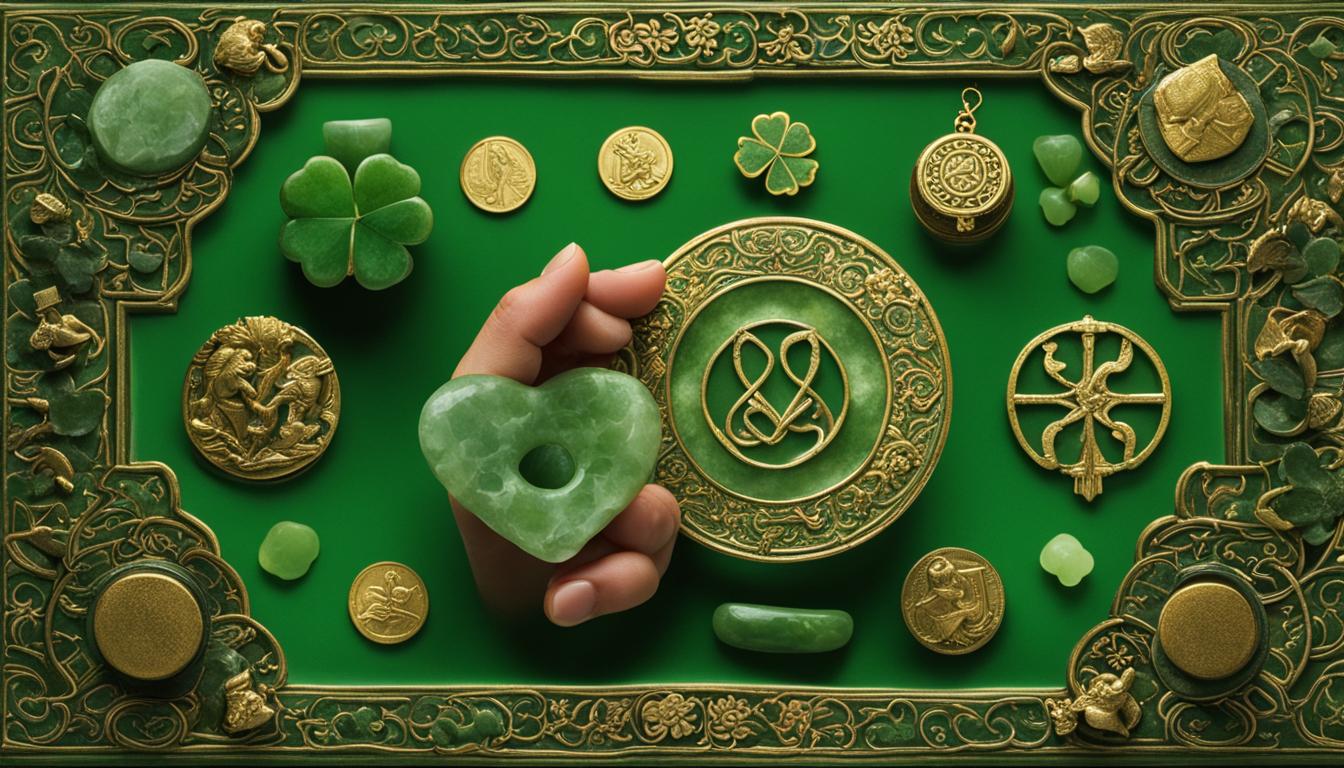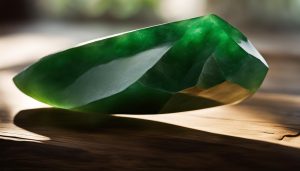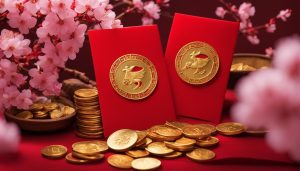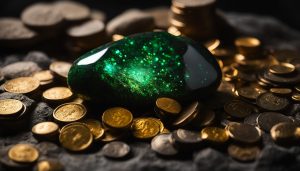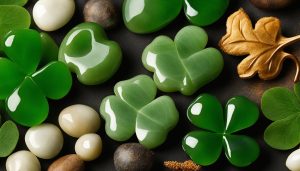Discover the fascinating world of jade gifting superstitions and unravel the cultural beliefs surrounding this precious stone.
In this article, we explore the symbolic meaning of jade, its traditional significance as a gift, and the myths and superstitions regarding its association with good fortune.
Whether you’re curious about Māori culture or fascinated by Chinese traditions, join us on this journey to understand the mystical allure of jade.
Contents
- 1 The Symbolic Meaning and Cultural Beliefs About Jade
- 2 The Traditional Significance of Jade as a Gift
- 3 Jade and Good Fortune: The Superstitions and Beliefs
- 4 The Myth of Bad Luck When Purchasing Jade for Yourself
- 5 Jade is a Precious and Durable Heirloom
- 6 The Global Appeal of Jade and its Healing Properties
- 7 Conclusion
- 8 FAQs
- 8.1 Is it considered good luck to give someone jade as a gift?
- 8.2 What is the symbolic meaning of jade and its cultural beliefs?
- 8.3 What is the traditional significance of jade as a gift in Māori culture?
- 8.4 Are there any superstitions or beliefs surrounding jade and good fortune?
- 8.5 Why is it believed that purchasing jade for oneself will bring bad luck?
- 8.6 What is the significance of jade as a precious and durable heirloom?
- 8.7 Does jade have any healing properties or symbolic meaning of purity?
- 8.8 In conclusion, is it good luck to give someone jade?
- 9 Source Links
Key Takeaways:
- Jades have been used for centuries to seal bonds, express gratitude, and show appreciation.
- Jade holds significant spiritual importance in Māori culture and is considered taonga, or treasures.
- In Chinese culture, jade symbolizes good fortune and protection and is believed to attract love.
- Gifting jade is a central practice in Māori and Chinese cultures to mark significant milestones and bring blessings.
- While there are superstitions about buying jade for oneself, it ultimately depends on individual beliefs.
The Symbolic Meaning and Cultural Beliefs About Jade
In Māori and Chinese cultures, jade holds deep symbolic meaning and is associated with various cultural beliefs. Understanding the significance of jade in these cultures helps shed light on the reverence and respect it is given as a gift.
Māori Culture:
In Māori culture, jade is known as pounamu and is considered a taonga, a treasure of great value. It is believed to be the essence of a taniwha, a spiritual water being, and holds spiritual significance.
Carvings made from pounamu often depict traditional Māori symbols and are passed down through generations as heirlooms. The giving and receiving of pounamu carvings are seen as a way to seal bonds, show appreciation, and express gratitude.
Also read: Discover What is it Good Luck to do in Bremen?
Chinese Culture:
In Chinese culture, jade is highly regarded and symbolizes good fortune and protection. It is believed to attract love, dispel negativity, and bring luck.
Wearing jade jewelry is a common practice and is often given as a gift to mark significant milestones or occasions. The belief in the positive energies of jade has made it a popular choice for various forms of art and decoration.
“Jade has a long history of being a symbol of purity, protection, and positive energy in many cultures.”
The symbolic meaning of jade goes beyond material value and represents cultural heritage, spiritual beliefs, and the interconnectedness of humanity. It is a stone that carries stories, traditions, and ancestors’ wisdom.
| Culture | Symbolic Meaning of Jade |
|---|---|
| Māori | Taonga, essence of taniwha, spiritual significance |
| Chinese | Good fortune, protection, love, attraction |
By understanding the cultural beliefs surrounding jade, we gain insight into why it is considered both a valuable gift and a cherished possession. Its symbolism extends beyond its physical beauty, making it a significant token of appreciation in these cultures.
The Traditional Significance of Jade as a Gift
Gifting jade has held great importance in both Māori and Chinese cultures for centuries. In Māori culture, the gifting of jade, known as pounamu, is a powerful expression of respect, gratitude, and appreciation.
Carved pounamu pieces, often adorned with traditional symbols, carry deep spiritual significance and are considered a great honor to receive. In Chinese culture, jade is gifted to mark significant milestones and is believed to bring abundance and blessings to the recipient.
In Māori culture, pounamu carvings are treasured as family heirlooms and carry the stories and connections to ancestors. These durable jade carvings are often named and serve as reminders of one’s lineage. The tradition of gifting pounamu strengthens the bonds between individuals and communities, embracing the values of unity and kinship.
In Chinese culture, jade is regarded as a symbol of harmony and prosperity. When jade is given as a gift, it is believed to bring good fortune and protection to the recipient.
Jade jewelry, such as jadeite bangles or pendants, is often worn to attract love, dispel negativity, and bring luck. Gifting jade signifies well wishes and symbolizes the giver’s desire for the recipient’s happiness and success.
Table: Traditional Symbolism of Jade in Māori and Chinese Cultures
| Māori Culture | Chinese Culture |
|---|---|
| Expression of respect, gratitude, and appreciation | Symbol of harmony and prosperity |
| Carvings hold profound spiritual significance | Worn to attract love and dispel negativity |
| Considered a great honor to receive | It brings good fortune and protection |
Whether it is the intricate pounamu carvings of the Māori or the beautiful jade jewelry of the Chinese, the traditional significance of gifting jade remains a testament to the enduring cultural values and beliefs surrounding this precious stone.
Jade and Good Fortune: The Superstitions and Beliefs
Throughout Māori and Chinese cultures, jade is widely regarded as a symbol of luck and good fortune. Superstitions and beliefs surrounding jade have been passed down through generations, shaping how it is revered and gifted.
In both cultures, jade is believed to possess its spirit, bringing protection and blessings to its owners.
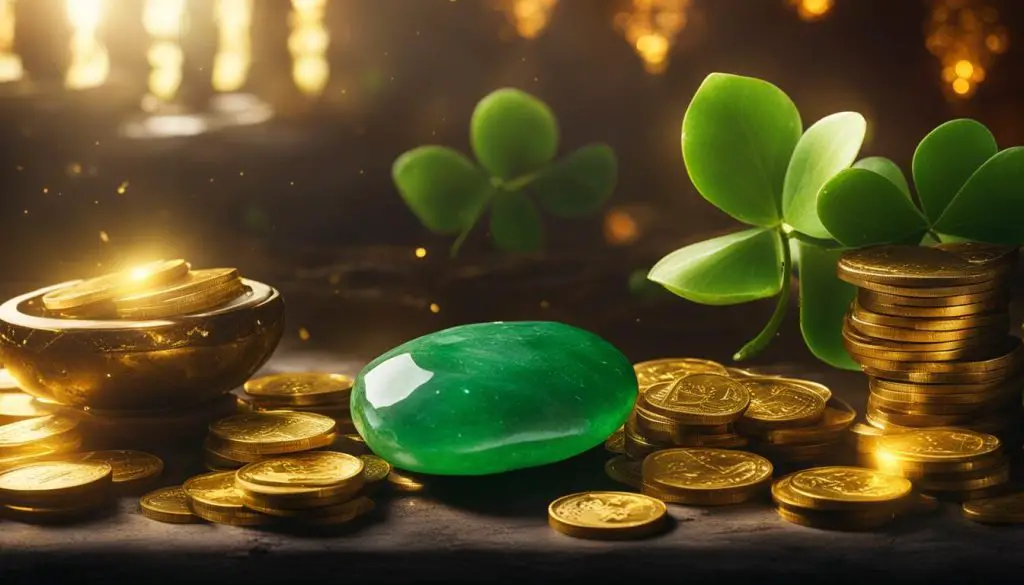
In Māori culture, jade is considered a sacred stone known as pounamu. It is believed that jade chooses its owners, and if worn by someone it has not chosen, it may anger the gods and bring bad luck.
This belief serves as a reminder of the importance of respecting the tapu, or sacredness, of jade. Chinese culture also values jade as a protective stone, believed to ward off misfortune. It is said that jade will break before a bad event occurs, serving as a warning and ensuring that good fortune lies ahead.
“Jade has its own spirit and chooses its owners. Wearing jade that has not chosen you may anger the gods and bring bad luck.”
These superstitious beliefs surrounding jade have influenced the traditional practice of gifting jade rather than purchasing it for oneself. By giving jade as a gift, it is believed that the tapu of the stone is separated from its source, ensuring that it will bring good fortune to the recipient.
Whether in a beautifully carved pounamu pendant or an intricately designed jade bracelet, gifting jade is seen as a gesture of respect, gratitude, and appreciation.
While these superstitions and beliefs add an air of mystery and reverence to jade, ultimately, purchasing jade for oneself or receiving it as a gift is a personal choice. Individuals are encouraged to embrace jade’s cultural significance and symbolism while also considering their own beliefs and practices.
Also read: Why It’s Good Luck to Plant on Good Friday!
The Myth of Bad Luck When Purchasing Jade for Yourself
There is a common belief that purchasing jade for oneself brings bad luck. However, this superstition is not supported by traditional teachings or cultural beliefs. The idea likely stems from interpretations of tapu and mana, which dictate respect and balance within society.
When jade is gifted to someone, it is given tapu (sacredness) and is separated from its tapu source. Buying jade for oneself may be seen as a violation of this balance and could potentially bring negative tapu, leading to the belief of bad luck.
It’s important to note that no specific traditional teaching states that choosing and purchasing jade for oneself will result in bad luck. The belief surrounding gifting jade and the tapu nature of the stone is subjective and varies among individuals and cultural practices.
While some people may adhere to the superstition, others may not consider it a factor when acquiring jade for personal use.
“The belief that it is bad luck to buy jade for oneself likely stems from interpretations of tapu and mana, which dictate respect and balance within society.”
Ultimately, purchasing jade for oneself should be based on personal beliefs and preferences. If you are drawn to the beauty and symbolism of jade and wish to incorporate it into your life, there is no inherent lousy luck associated with doing so.
Whether you gift jade or purchase it for yourself, the significance lies in the meaning and value you attribute to the stone.
| Jade Gifting Superstitions and Cultural Beliefs | Summary |
|---|---|
| The belief that buying jade for oneself brings lousy luck | Not supported by traditional teachings or cultural beliefs |
| Interpretations of tapu and mana influencing the superstition | Tapu and mana dictate respect and balance within society |
| Personal opinions and cultural practices | The decision to purchase jade for oneself is subjective |
| There is no inherent bad luck in purchasing jade for personal use | The significance lies in the personal meaning and value attributed to the stone |
Jade is a Precious and Durable Heirloom
Jade carvings hold immense sentimental and cultural value, often passed down through generations as cherished family heirlooms. The durability of jade ensures that these carvings last for many years, preserving the stories and connections to ancestors.
In Māori culture, pounamu carvings were often named and served as a reminder of the wearer’s lineage and heritage.
In addition to their emotional significance, jade carvings hold profound cultural importance. They are considered taonga, or treasures, in Māori culture, symbolizing respect and appreciation for one’s ancestors. Passed down as heirlooms, these carvings continue to be cherished and serve as a link to family history.
In Chinese culture, jade is a symbol of longevity and purity. Carved jade artifacts, such as figurines or jewelry, are often passed down through generations, signifying the preservation of family traditions and values. The durability of jade ensures that these heirlooms stand the test of time, maintaining their beauty and significance for years to come.
Jade’s cultural and sentimental value as a precious heirloom cannot be underestimated. Its enduring nature and deep-rooted symbolism make it a treasured possession, representing the connection to one’s heritage and the preservation of family legacy.
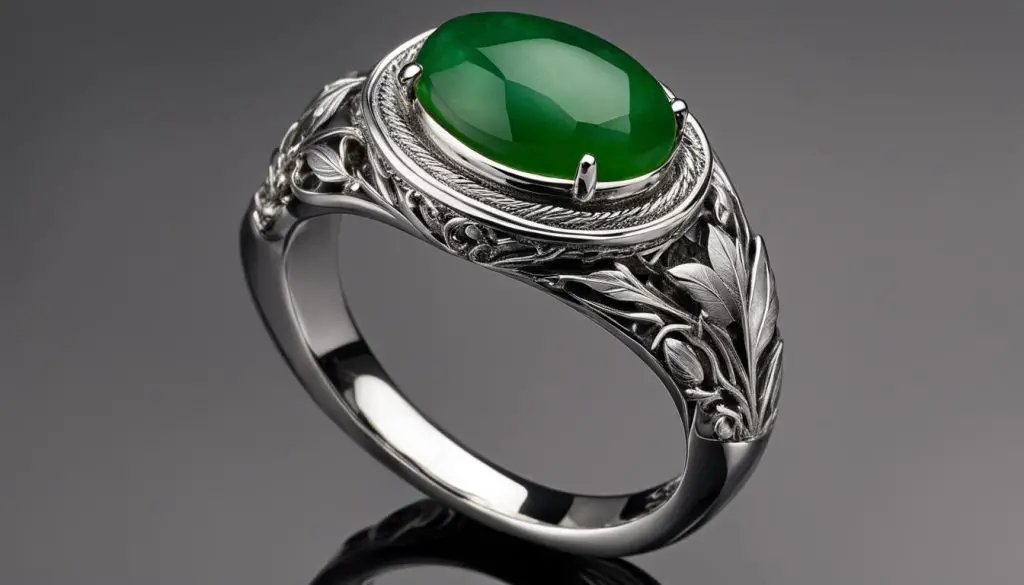
Table: Comparing the Cultural Significance of Jade as a Heirloom
| Māori Culture | Chinese Culture |
|---|---|
| Carvings hold spiritual significance and are considered taonga (treasures) | Jade artifacts symbolize longevity and purity |
| Named carvings serve as reminders of the wearer’s ancestry | Heirlooms preserve family traditions and values |
| Passed down through generations, connecting present and past | Symbolize the preservation of family legacy |
The Global Appeal of Jade and its Healing Properties
Jade is a gemstone that holds not only cultural significance but also a reputation for its healing properties. In various cultures, jade is believed to possess qualities that promote physical well-being and inner harmony. Its association with purity and positive energy has made it a sought-after stone for adornment and spiritual practices.
Jade is a Symbol of Purity
Jade has long been revered as a symbol of purity, representing the essence of nature’s beauty and balance. Its beautiful green hue is believed to bring tranquility and serenity to those who wear it or have it in their surroundings.
In Chinese culture, jade is associated with yin energy, which represents the feminine essence and is believed to promote nurturing and healing qualities.
Physical Healing Properties
Aside from its symbolic significance, jade is known for its physical healing properties. It is believed to have a soothing effect on the body and mind, promoting overall well-being.
In traditional Chinese medicine, jade is often used to treat ailments related to the kidneys and the body’s filtration processes. Its cooling properties alleviate symptoms of kidney and bladder issues and promote proper organ function.
Jade’s healing properties are not limited to physical ailments. It is also thought to have a calming effect on the mind, relieving stress and anxiety.
Many people use jade in their meditation practices to connect with their inner selves and find peace and clarity. Its smooth and cool texture makes it a popular choice for massage tools, as it is believed to promote circulation and release tension.
The Power of Jade’s Energy
Jade has been considered a protective stone for centuries, guarding against accidents, negativity, and harmful influences. Its energy is believed to create a shield of positivity around the wearer, promoting good fortune and warding off misfortune.
Jade is often worn as jewelry to keep its energy close to the body and harness its protective qualities throughout the day.
Jade’s global appeal extends beyond its cultural significance. The healing properties associated with this gemstone have captivated people for centuries. Whether worn as jewelry, used in meditation, or admired for its beauty, jade continues to be treasured for its ability to promote physical healing, inner peace, and protection.
Conclusion
In conclusion, gifting jade is unique in both Māori and Chinese cultures. It is believed to bring the recipient good luck, protection, and blessings. Jade’s symbolic meaning as a stone of luck and purity resonates deeply within these cultures.
Giving jade as a gift is a way to express respect, gratitude, and appreciation. It is considered a high honor to receive a carved pounamu or a jade adornment, as it carries significant spiritual and cultural significance.
Although superstitions and beliefs surround the purchase of jade for oneself, it ultimately comes down to individual beliefs and cultural practices. Whether you believe in the good luck associated with jade or appreciate its symbolic meaning, this precious stone continues to captivate people worldwide.
Also, read all other articles regarding good luck
FAQs
Is it considered good luck to give someone jade as a gift?
Yes, in Māori and Chinese cultures, gifting jade is believed to bring the recipient good luck, protection, and blessings.
What is the symbolic meaning of jade and its cultural beliefs?
Jade symbolizes good fortune, love, protection, and purity. It holds deep cultural significance in Māori and Chinese cultures, where it is believed to have spiritual and healing properties.
What is the traditional significance of jade as a gift in Māori culture?
In Māori culture, jade, known as pounamu, is considered taonga (treasure). Giving carved pounamu as a gift is a sign of respect, gratitude, and appreciation, and the carvings hold spiritual significance and honor the wearer’s ancestors.
Are there any superstitions or beliefs surrounding jade and good fortune?
Māori and Chinese cultures believe that jade brings good luck and protection. It is thought that wearing jade will attract love, dispel negativity, and ensure good fortune lies ahead. Some believe that jade will break before a bad event occurs, serving as a warning.
Why is it believed that purchasing jade for oneself will bring bad luck?
The belief stems from interpretations of tapu and mana in Māori culture, emphasizing respect and balance within society. GGifting jade gives liveness and separates it from its tapu source. Buying jade for oneself may be seen as a violation and bring negative tapu, leading to bad luck.
What is the significance of jade as a precious and durable heirloom?
Jade carvings, especially those passed down through generations, are considered unique and significant family heirlooms. They carry the stories and connections to ancestors and hold sentimental and cultural value.
Does jade have any healing properties or symbolic meaning of purity?
Jade promotes physical healing, especially for the kidneys and the body’s filtration processes. It is also seen as a protective stone, guarding against accidents and negative influences. Jade is associated with purity and is commonly used in jewelry and meditation and placed in homes or offices for positive energy.
In conclusion, is it good luck to give someone jade?
Yes, gifting jade is considered a tradition of respect, gratitude, and appreciation in Māori and Chinese cultures. Jade is believed to bring the recipient good luck, protection, and blessings, making it a cherished gift across different cultures.

